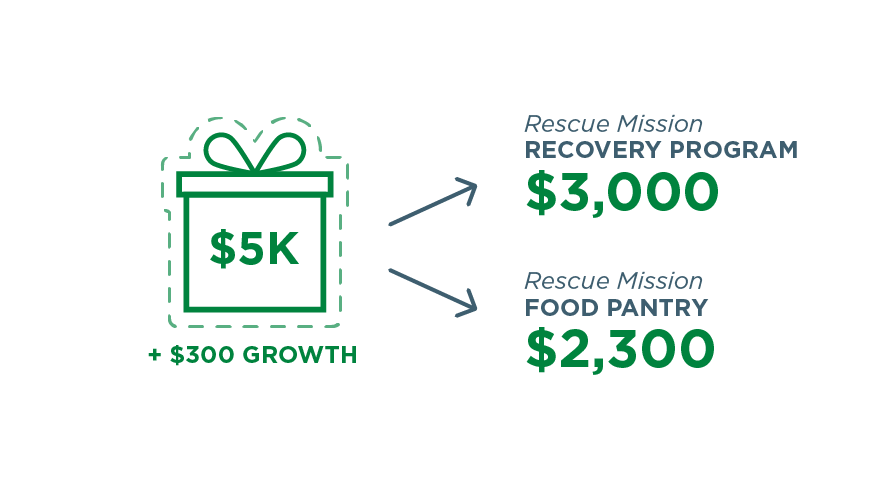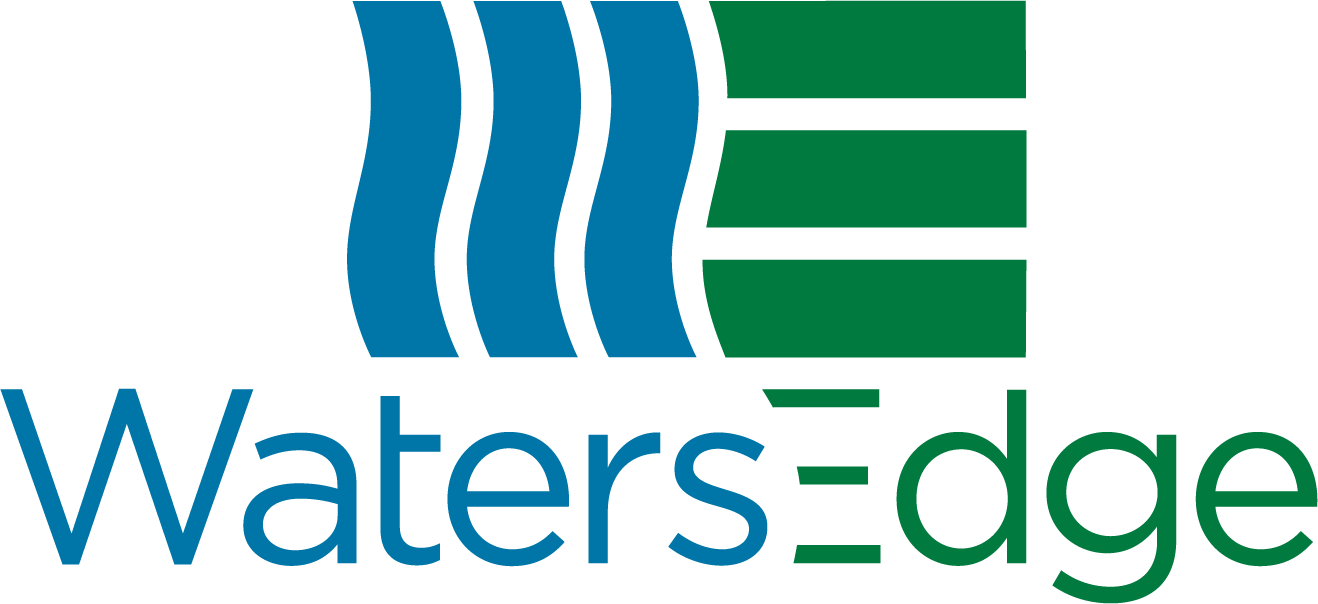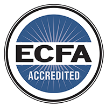Single Charity Fund

Connect With Our Experts
Make a Long-Term Impact with a Single Charity Fund.
A single charity fund (SCF) is the perfect giving solution for anyone seeking to make a continuing impact on a specific ministry. Similar to a donor advised fund (DAF), an SCF acts like a savings account for your charitable giving. But unlike a DAF, which allows you to give to any 501(c)(3) nonprofit organization, an SCF focuses your giving on a single charitable beneficiary. Also unlike a DAF, SCFs can be funded with qualified charitable distributions (QCDs) from a traditional IRA.
It’s simple: you make gifts to an SCF and receive immediate tax benefits. Your gifts grow through investment. When you’re ready to grant funds from your SCF to the ministry, you identify how you want the ministry to use the funds and WatersEdge sends the check on your behalf with the click of a button — no paperwork, no hassle.

Key Benefits

Give To Your Passion
Use your SCF to fund specific projects — building campaigns, scholarships, or whatever you’re passionate about. You can be sure your gift is making the right impact at the right time.
Fund with Your IRA
SCFs can receive qualified charitable distributions of up to $105,000 annually from your IRA, reducing your taxable income. If you take the standard deduction, you can receive tax advantages without itemizing your deductions.
Multiply Your Giving
Your contributions are invested and grow tax-free, maximizing Kingdom impact when you’re ready to grant funds.
Enjoy Flexibility, Freedom, and Ease
Make grants immediately or build toward a specific project. Create a customized distribution plan or contribute to and invest in an endowment to support your ministry even after you’re gone.Start Here
Our experienced staff at WatersEdge will guide you through the process so you can support the charitable cause you care about — at the click of a button.
CONNECT WITH US
Virtually, by phone or in-person, our giving professionals are ready to help you set up your account.
FUND YOUR SCF
Transfer assets to your account for the benefit of the ministry you’ve chosen.
MAKE GIFTS
When you identify how you want the ministry to use the funds, we’ll send the check.
Can I Create An SCF For That?
You can create a single charity fund to support any active, qualified charitable organization with a 501(c)(3) designation as well as your church. However, your gift must be entirely charitable and cannot provide you or your household with any direct or incidental benefits. We’ve created the guide below to help you know what nonprofits you can — and can’t — support using an SCF.
Your church (tithes, offerings, building campaigns)
Southern Baptist/faith-aligned ministries
Special offerings (Lottie Moon, Annie Armstrong, state missions offerings)
Missions organizations (IMB, NAMB, etc.)
Disaster relief (Southern Baptist Disaster Relief, Send Relief, Samaritan’s Purse, Red Cross, etc.)
Universities and seminaries
Food banks and shelter ministries
Any nonprofit recognized by the IRS as a 501(c)(3) organization
Political parties, PACs, candidates running for election
Tickets to a charitable event or benefit (dinners, banquets, golf tournaments, auctions, sponsorships)
Dues, membership fees or pledges
Gifts that provide private benefit to you or any other individual
Private foundations or non-functionally integrated “Type III” supporting organizations
Organizations whose mission is incompatible with WatersEdge social screens
Giving Example
Jane Sims has always been passionate about giving to alleviate homelessness. Using $5,000, Jane opened a SCF with WatersEdge to support a local rescue mission, receiving an immediate tax benefit from the gift even though she didn’t disburse the funds immediately. After the account grew through investment, Jane made grants from her SCF to the mission’s recovery program, and then later to the food pantry. WatersEdge handled the administrative side, sending checks to the mission on her behalf.

A Single Charity Fund May Be Perfect If:
You’re focused on one specific Kingdom cause or ministry.
You’re interested in a longer-term project, like a building campaign or scholarship fund.
You want an immediate tax deduction.
You want contributions to grow over time.
You want to fund your account with an IRA charitable rollover.
You want the flexibility to give on your own time.

“I use a single charity fund to give because it accepts IRA charitable rollovers, which provide significant tax savings. An SCF also allows me to choose when my gift goes to my church, so I can support a variety of activities like missions offerings, youth camps, or even a building campaign.”
Dr. Randy Ice
Professor of Finance | Oklahoma City, Oklahoma
Go Deeper
Tax Impacts
People who itemize maximize tax benefits by receiving an immediate tax deduction that can potentially benefit them for five filing years. Even if no grants are made immediately, donors are eligible for an immediate tax deduction upon funding the single charity fund. Funding your SCF with appreciated securities can help you to eliminate capital gains tax.
Every time you fund your SCF, you will receive a receipt. When it comes tax time, instead of having to gather all of your own receipts, you will be able to view all giving statements in the online platform; you will also receive an annual giving summary.
Fees
There are no fees to open an account or process grant requests. You can choose from funds with no management fees or other SCF investment options with low management fees. WatersEdge uses a tiered fee structure based on your SCF’s average daily balance, where you will be charged monthly out of an annual fee. Each charge is 1/12th of what you can see on the fee structure below. There are no fees related to a minimum account balance.
The tiered structure is as follows:
- First $250K: .75% of balance
- Next $250K: .60% of balance
- Next $500K: .35% of balance
- Over $1mm: .20% of balance
Minimums
- SCF minimum account funding is $1,000.
- When making grant recommendations, grant minimums are $250.
- There is no minimum balance amount.
Investment Options
All investments are socially screened and there are prohibitive restrictions placed on investments in alcohol, tobacco, cannabis, pornography, gaming, abortion, embryonic stem cell research, payday loan practices, human trafficking, and forced child labor.
You have the option to diversify your investments in the following:
General Investment Pool – The General Investment Pool is managed by the WatersEdge Board of Directors and invests in a wide range of asset classes. It is allocated into 70% equity, 20% income oriented and 10% inflation oriented.
Developed Market Equity – The Developed Market Equity Fund is a low-cost way to gain diversified exposure to global large and mid-sized companies across all 23 developed markets countries, the largest of which is the United States with approximately 65%. Specifically, the fund is passively managed according to a customized S&P Developed Large‐Mid Cap Index with a slight tilt to value securities. This index is very similar to the MSCI World benchmark. Due to its broad diversification, it may be considered a core equity holding in a portfolio.
Emerging Markets Equity – The Emerging Markets Equity Fund is passively managed with the MSCI Emerging Markets index and aims to invest in emerging market countries. Stock of companies in emerging markets tend to be more volatile than those in developed countries, which could imply a greater risk-reward profile.
Domestic Bonds – The Domestic Bond Fund utilizes a core plus fixed-income strategy. This strategy allows the investment team to pursue “plus” sectors like emerging market debt, non-investment grade credits and convertible bonds. The fund is managed according to the Barclays Capital Aggregate Bond Index.
Cash Equivalent Pool – The Cash Equivalent Pool is designed as a money-market investment vehicle.
GuideStone Mutual Fund Family– Additional mutual fund options are available including any in the GuideStone family of funds. GuideStone employs social screens on their funds which are substantially like those used by WatersEdge. Information on these funds can be found here GuideStone Funds®. Please call WatersEdge for additional information.
Customer Service
At WatersEdge, we want your ministries to receive their gifts from you as soon as possible. Our dedicated staff ensures your grant recommendations are distributed within 2-3 business days. Unlike some larger foundations and financial organizations, you will have a designated WatersEdge expert to talk to.
If your SCF is managed by your personal financial advisor, the timeline is dependent upon your advisor. WatersEdge cannot send any money out until your advisor has liquidated an asset and then sent the cash to WE.
Online Platform
WatersEdge has an online platform (through a third-party service) where you can add funds to your SCF and send grants. You also have the option to view statements, giving history, grant history and more.
What Assets Can Fund This Gift?
- Cash
- Qualified distributions from an IRA
- Publicly traded stocks and bonds
- Mutual funds
- Real estate
- Many privately held investments
Advisor Options
If you would prefer for your financial advisor to retain oversight of your funds, WatersEdge has an option to create an Advisory SCF. This option also allows you to have more choices in how your funds are invested. For more information call our Director of Donor Relations, Holly Blakey, at 405-532-2481.
FAQ
1. What are the benefits of having a SCF?
Think of a single charity fund (SCF) as a savings account for the Kingdom cause you’re giving to. In many ways, it works the same as a 401k (a savings account for retirement), or a 529 account (a savings account for funding higher education costs). Like any of these savings accounts, they are designed to accumulate in value for the benefit of a future expenditure.
Single charity funds are simple to open, provide a charitable tax deduction whenever money goes into the account, and are easy to grant/gift money to your ministry of choice whenever you are ready to do so.
SCFs are meant to simplify a donor’s charitable giving plus add accrued interest, which maximizes your gifts to the chosen charity. You get one gift receipt for each contribution to the SCF – all you have to do is tell us in writing when you want to give and we handle the rest.
2. So, I can only give to one charity?
Yes — with an SCF, you choose one specific ministry to give to. For a similar fund that allows gifts to any charity of your choice, consider a Donor Advised Fund (DAF).
3. What kind of a tax deduction comes with a gift to a single charity fund?
Contributions to your SCF receive immediate tax benefits.
4. How do SCFs generate income?
SCF contributions are invested and grow to maximize impact. All the growth of your initial gift is tax free. On an initial $1,000 SCF gift, your account may grow before your first grant is made.
5. Why are SCFs considered a simple way to manage charitable giving?
We take the hassle out of giving. You choose which 501(c)3 charitable organization you want to support and make a “grant” to that organization. WatersEdge sends the checks and manages the paperwork for you. You will get one receipt for each contribution to the SCF.
6. How do I make a grant?
You can make grants from your online account or send us an email or letter with your grant instructions. As long as we have a written record of your request, your grant will be made.
7. How quickly does the charity receive my SCF grant?
SCF grants are processed within 3-4 days and checks are sent via regular USPS mail.
8. Can I set up recurring grants to be made?
Absolutely. For example, many donors set up a grant to be made to their chosen ministry (such as their home church) on a monthly basis through an SCF.
9. What if an SCF has an account balance at the end of the year?
SCF balances will roll over until an account is fully depleted.
10. What happens to the balance of an SCF once a donor passes away?
You can name a successor advisor (such as your child) to manage the funds and make grants after you are gone. Otherwise, the fund will be distributed to the designated charity.
Create Your SCF Today
Review Your Giving Options
When you give generously, the details make all the difference. It’s important to keep in mind your family situation, tax considerations and charitable goals.
Make the right choice with a simple side-by-side comparison.








